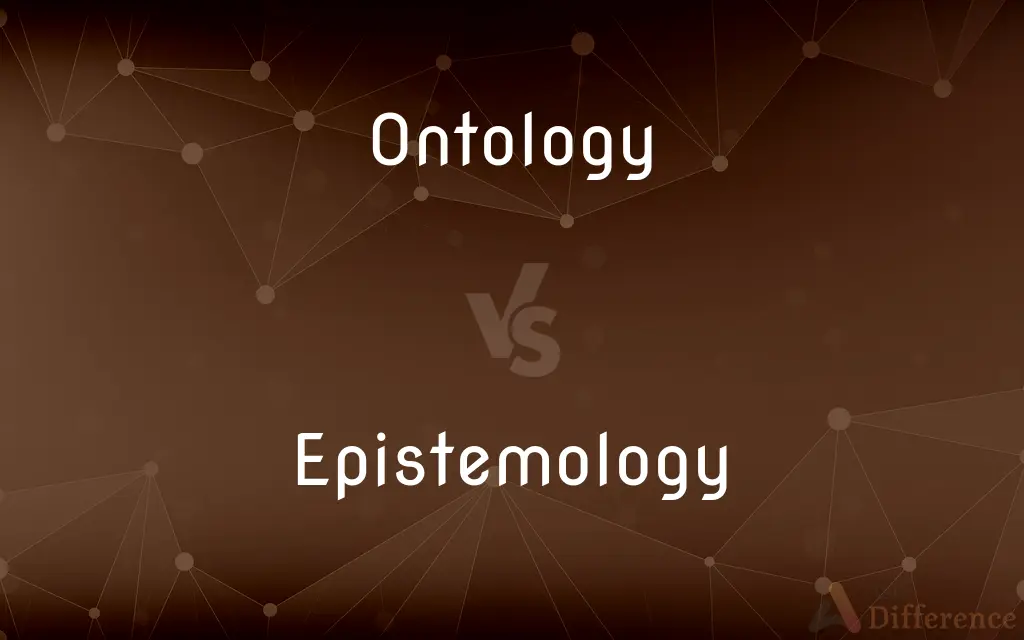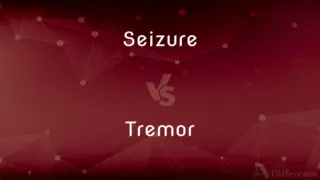Ontology vs. Epistemology — What's the Difference?
Edited by Tayyaba Rehman — By Fiza Rafique — Updated on September 25, 2023
Ontology studies the nature of being and reality, while Epistemology examines the nature and limits of knowledge.

Difference Between Ontology and Epistemology
Table of Contents
ADVERTISEMENT
Key Differences
Ontology and Epistemology are foundational disciplines within philosophy. Ontology delves into the nature of existence and the categorization of being. It tries to answer questions such as "What is real?" and "What kinds of entities exist?" By contrast, Epistemology is focused on knowledge, its nature, and how we come to know things. It grapples with questions like "What can we know?" and "How do we know what we know?"
The distinction between Ontology and Epistemology is akin to the difference between "what is" and "how we know." While Ontology is concerned with the actual structure of reality, encompassing entities and their relationships, Epistemology centers on the sources, nature, and limits of knowledge. It's the study of belief, justification, and truth as they relate to knowledge.
Ontology, in its exploration, might ponder over the existence of abstract entities like numbers, or whether objects have an existence outside our minds. It debates the nature of entities, be they physical, mental, or otherwise. Epistemology, meanwhile, delves into the tools and methods of gaining knowledge, such as perception, reason, and intuition. It assesses the validity and reliability of these sources.
When delving deep into any subject or research, understanding both Ontology and Epistemology becomes crucial. Scholars often start by outlining their ontological and epistemological positions. By doing so, they're clarifying not only what they believe exists but also how they plan to gain knowledge about it. These disciplines, therefore, serve as foundational pillars in the realm of academic research and philosophical inquiry.
Comparison Chart
Focus
Nature of being and reality
Nature and limits of knowledge
ADVERTISEMENT
Questions
"What is real?"
"How do we know?"
Concerns
Entities and their existence
Sources and validity of knowledge
Example
Existence of abstract entities like numbers
Reliability of sensory perception
Role in Research
Outlines the nature of entities studied
Determines methods of gaining knowledge
Compare with Definitions
Ontology
A categorization or systematization of entities.
The Ontology of this research distinguishes between physical and mental phenomena.
Epistemology
Philosophical exploration of how we know things.
In Epistemology, reason and experience are often contrasted as sources of knowledge.
Ontology
Philosophical examination of being and reality.
Philosophers often turn to Ontology to discuss the nature of reality.
Epistemology
The study of knowledge and its limits.
Epistemology challenges our understanding of truth.
Ontology
The study of the nature of existence.
Ontology debates if abstract concepts like love truly exist.
Epistemology
Investigating the validity of knowledge sources.
Epistemology questions if sensory perception is always reliable.
Ontology
Delving into the essence and properties of things.
Ontology can offer insights into the essence of consciousness.
Epistemology
Concerned with the nature of belief and justification.
The debate in Epistemology revolves around what justifies a belief.
Ontology
Ontology is the branch of philosophy that studies concepts such as existence, being, becoming, and reality. It includes the questions of how entities are grouped into basic categories and which of these entities exist on the most fundamental level.
Epistemology
Analysis of the relationship between belief, truth, and knowledge.
Epistemology seeks to determine when beliefs can be termed as knowledge.
Ontology
The branch of metaphysics that deals with the nature of being.
Epistemology
Epistemology ( (listen); from Greek ἐπιστήμη, epistēmē 'knowledge', and -logy) is the branch of philosophy concerned with knowledge. Epistemologists study the nature, origin, and scope of knowledge, epistemic justification, the rationality of belief, and various related issues.
Ontology
(Computers) A system for naming, classifying, and defining objects.
Epistemology
The branch of philosophy that examines the nature of knowledge, its presuppositions and foundations, and its extent and validity.
Ontology
The branch of metaphysics that addresses the nature or essential characteristics of being and of things that exist; the study of being qua being.
Epistemology
(uncountable) The branch of philosophy dealing with the study of knowledge; theory of knowledge, asking such questions as "What is knowledge?", "How is knowledge acquired?", "What do people know?", "How do we know what we know?", "How do we know it is true?", and so on.
Some thinkers take the view that, beginning with the work of Descartes, epistemology began to replace metaphysics as the most important area of philosophy.
Ontology
In a subject view, or a world view, the set of conceptual or material things or classes of things that are recognised as existing, or are assumed to exist in context, and their interrelations; in a body of theory, the ontology comprises the domain of discourse, the things that are defined as existing, together with whatever emerges from their mutual implications.
Epistemology
(countable) A particular instance, version, or school thereof; a particular theory of knowledge.
In his epistemology, Plato maintains that our knowledge of universal concepts is a kind of recollection.
Ontology
The theory of a particular philosopher or school of thought concerning the fundamental types of entity in the universe.
Epistemology
The theory or science of the method or grounds of knowledge.
Ontology
(logic) A logical system involving theory of classes, developed by Stanislaw Lesniewski (1886-1939).
Epistemology
The philosophical theory of knowledge
Ontology
A structure of concepts or entities within a domain, organized by relationships; a system model.
Ontology
That department of the science of metaphysics which investigates and explains the nature and essential properties and relations of all beings, as such, or the principles and causes of being.
Ontology
A systematic arrangement of all of the important categories of objects or concepts which exist in some field of discourse, showing the relations between them. When complete, an ontology is a categorization of all of the concepts in some field of knowledge, including the objects and all of the properties, relations, and functions needed to define the objects and specify their actions. A simplified ontology may contain only a hierarchical classification (a taxonomy) showing the type subsumption relations between concepts in the field of discourse. An ontology may be visualized as an abstract graph with nodes and labeled arcs representing the objects and relations.
Ontology
The metaphysical study of the nature of being and existence
Ontology
A framework that defines how entities are related.
The project's Ontology laid out the relationship between different datasets.
Common Curiosities
What is the primary focus of Ontology?
Ontology focuses on the nature of being and reality.
Why is Ontology important in research?
Ontology clarifies the nature of entities being studied and their relationships, grounding research perspectives.
Can you provide an example of an ontological question?
"Do numbers exist independently of the human mind?" is an ontological question.
How does Epistemology view perception as a knowledge source?
Epistemology investigates the reliability and validity of perception as a source of knowledge.
Does Epistemology accept all beliefs as knowledge?
No, Epistemology differentiates between mere beliefs and justified, true knowledge.
Can Epistemology help in distinguishing between science and pseudoscience?
Yes, by examining the validity and justification of knowledge claims, Epistemology can discern scientific methods from non-scientific ones.
What's a core debate in Ontology?
A core debate is whether reality is objective (exists independently) or subjective (mind-dependent).
Are Ontology and Epistemology exclusive to philosophy?
While rooted in philosophy, both disciplines are also vital in various research fields, shaping methodologies.
How does Ontology approach the concept of time?
Ontology debates the nature of time, such as whether it's absolute, relational, or an illusion.
How does Epistemology approach the concept of knowledge?
Epistemology examines the nature, sources, and limits of knowledge.
How do Ontology and Epistemology interrelate?
While Ontology defines what exists, Epistemology determines how we come to know about it.
How does Epistemology view intuition?
Epistemology examines the role of intuition as a knowledge source, discussing its reliability and validity.
Is Ontology only about physical existence?
No, Ontology can also delve into abstract, non-physical entities like emotions or ideas.
Can a researcher's epistemological stance influence their methods?
Yes, a researcher's beliefs about knowledge (Epistemology) often shape their research methods.
Why is Epistemology important for educators?
Understanding Epistemology helps educators recognize how students process and validate information, shaping pedagogical approaches.
Share Your Discovery

Previous Comparison
Seizure vs. Tremor
Next Comparison
Generator vs. AlternatorAuthor Spotlight
Written by
Fiza RafiqueFiza Rafique is a skilled content writer at AskDifference.com, where she meticulously refines and enhances written pieces. Drawing from her vast editorial expertise, Fiza ensures clarity, accuracy, and precision in every article. Passionate about language, she continually seeks to elevate the quality of content for readers worldwide.
Edited by
Tayyaba RehmanTayyaba Rehman is a distinguished writer, currently serving as a primary contributor to askdifference.com. As a researcher in semantics and etymology, Tayyaba's passion for the complexity of languages and their distinctions has found a perfect home on the platform. Tayyaba delves into the intricacies of language, distinguishing between commonly confused words and phrases, thereby providing clarity for readers worldwide.
















































